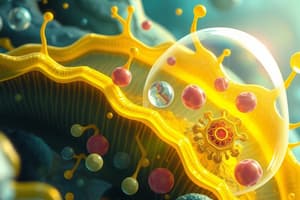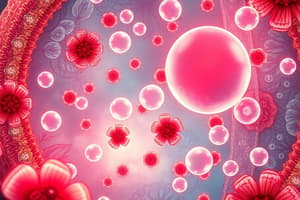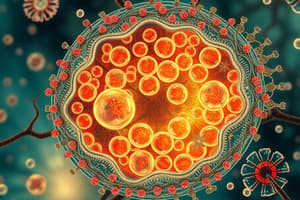Podcast
Questions and Answers
What is the function of the Cell Membrane?
What is the function of the Cell Membrane?
- Stores genetic information
- Produces energy
- Protects the cell from its surroundings (correct)
- Synthesizes proteins
What is the function of the Cell Wall?
What is the function of the Cell Wall?
Acts as a pressure vessel, preventing over-expansion when water enters the cell.
What is Cytoplasm?
What is Cytoplasm?
The material or protoplasm within a living cell, excluding the nucleus.
What is the function of a Ribosome?
What is the function of a Ribosome?
What is the function of the Nucleus?
What is the function of the Nucleus?
What is the Nuclear Envelope?
What is the Nuclear Envelope?
What is a Nucleolus?
What is a Nucleolus?
What is Chromatin?
What is Chromatin?
What is the function of the Endoplasmic Reticulum?
What is the function of the Endoplasmic Reticulum?
What is the function of the Golgi Apparatus?
What is the function of the Golgi Apparatus?
What is the function of Mitochondria?
What is the function of Mitochondria?
What is the function of Chloroplast?
What is the function of Chloroplast?
What is the function of Vacuole?
What is the function of Vacuole?
What is the function of Lysosome?
What is the function of Lysosome?
What is the function of Centrioles?
What is the function of Centrioles?
What is the function of ATP?
What is the function of ATP?
What is a Concentration Gradient?
What is a Concentration Gradient?
What is Equilibrium?
What is Equilibrium?
What is Passive Transport?
What is Passive Transport?
What is Active Transport?
What is Active Transport?
What is Osmosis?
What is Osmosis?
What is Diffusion?
What is Diffusion?
What are Marker Proteins?
What are Marker Proteins?
What are Receptor Proteins?
What are Receptor Proteins?
What is an Enzyme Protein?
What is an Enzyme Protein?
What is a Transport Protein?
What is a Transport Protein?
What is an Isotonic Solution?
What is an Isotonic Solution?
What is a Hypertonic Solution?
What is a Hypertonic Solution?
What is a Hypotonic Solution?
What is a Hypotonic Solution?
What is a Carrier Protein?
What is a Carrier Protein?
Flashcards are hidden until you start studying
Study Notes
Cell Membrane and Organelles Overview
- Cell Membrane: Protects the cell from its surroundings; regulates what enters and exits.
- Cell Wall: Acts as a pressure vessel; prevents over-expansion from water influx in plant cells.
- Cytoplasm: Gel-like substance within the cell, excluding the nucleus; site of many metabolic processes.
Cellular Structures
- Ribosome: Cell structure responsible for protein synthesis.
- Nucleus: Controls cell activities and gene expression; maintains genetic integrity.
- Nuclear Envelope: Double membrane enclosing the nucleus; separates nuclear contents from cytoplasm.
- Nucleolus: Dense structure within the nucleus; involved in ribosome production.
- Chromatin: Consists of DNA and proteins; forms chromosomes during cell division.
Protein Processing and Energy Production
- Endoplasmic Reticulum (ER): Folds protein molecules into cisternae and transports them to the Golgi apparatus.
- Golgi Apparatus: Modifies, sorts, and packages proteins for secretion or delivery within the cell.
- Mitochondria: Produces ATP (energy currency) through respiration; regulates metabolism.
- Chloroplast: Converts sunlight into sugars through photosynthesis in plant cells.
Storage and Waste Management
- Vacuole: Stores cellular waste and harmful materials; larger in plant cells.
- Lysosome: Contains enzymes for digesting cellular waste and recycling old organelles.
Cell Division and Functionality
- Centrioles: Assist in cell division in animal cells by organizing the mitotic spindle.
Energy and Transport Mechanisms
- ATP (Adenosine Triphosphate): Essential for energy transfer within cells; fuels muscle contractions and transport work.
- Concentration Gradient: Movement process where particles disperse from high to low concentration areas.
- Equilibrium: Stable condition achieved when opposing forces balance each other.
Transport Processes
- Passive Transport: Movement across membranes without energy input; follows concentration gradient.
- Active Transport: Movement against concentration gradient, requiring energy; involves enzymes.
- Osmosis: Movement of solvent molecules through a semi-permeable membrane, equalizing concentrations.
- Diffusion: Spontaneous movement of molecules from high to low concentration.
Membrane Proteins
- Marker Proteins: Serve as cell identifiers; present in cell membranes.
- Receptor Proteins: Bind signaling molecules to trigger cellular responses.
- Enzyme Proteins: Catalyze biochemical reactions, increasing reaction rates.
- Transport Proteins: Facilitate movement of substances within and across cell membranes.
- Carrier Proteins: Specific for particular substances; transport them across cell compartments.
Solution Types
- Isotonic Solution: Two solutions with equal osmotic pressure; no net movement of water.
- Hypertonic Solution: Higher solute concentration outside the cell; can cause cell to shrink.
- Hypotonic Solution: Lower solute concentration outside the cell; can lead to cell swelling and bursting.
Studying That Suits You
Use AI to generate personalized quizzes and flashcards to suit your learning preferences.




